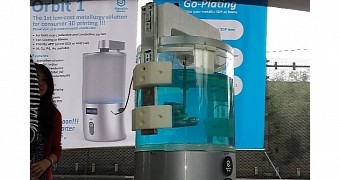Metal 3D printers not only cost a lot, to say the least, but they also have a problem in how the filament, powder, or whatever form the materials come in tends to sell for a lot of cash as well. Now, though, the people at Monolith Studio might have figured out a way around both problems.
Basically, the company didn't create a metal 3D printer, but a device that will add a coating of metal to any 3D printed object you may produce.
Admittedly, it means that you still have to buy an actual 3D printer and, well, print stuff, but considering that FDM printers ship for $500 - $1000 now (and just as many euro in Europe), that shouldn't be too hard to cope with.
Especially since the Monolith Studio Orbit 1 (that's the name of the new invention) will cost $3,000 / €3,000, or $4,000 / €4,000.
The Orbit 1 metal plating device
It's actually a pretty clever idea to make something like this. You don't need to give the product the same abilities as a 3D printer, and you don't have to pay nearly as much for metal as you otherwise would.
Sure, the price of five grand is high, especially since consumer 3D printers (plastic-using ones based on FDM technology anyway) ship for a tenth of that.
But when you factor in the normal price of metal 3D printers (several tens of thousands of dollars for the really rare and recent ones, hundreds of thousands for all others), it's pretty low.
How does it work? Essentially, the Orbit 1 takes a 3D printed object and dunks it in a tank, where you coat it with whatever metal you prefer, out of the following options: copper, lead, nickel, and gold. The product is hung from a hook on the lid and spun in metal liquid and chemical.
Moreover, you can choose from 2 different settings. One process gives you simple control, the other lets you do more than just hit a few buttons and wait. You can use an app to handle the process. You even get alerts when the solution is changed.
Possible uses beyond fun
While it's nice to be able to coat a plastic or rubber duck in actual gold (and still have it float), more important is that you could use the Orbit 1 to make 3D printed electronics, or otherwise conductive objects.
The “Go-Plating” isn't even limited by material. Sure, you only get four coating options, but the coating itself should stick to anything (PLA, ABS, sandstone, metal, nylon, food). Shipments should start by early 2015, assuming the Kickstarter campaign goes online by that point. If it pays off, though, the retail price will be higher than the sums mentioned above. It's always the case with crowd-funded initiatives.

 14 DAY TRIAL //
14 DAY TRIAL // 